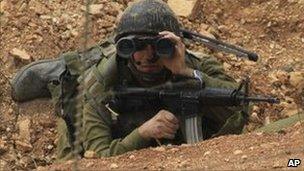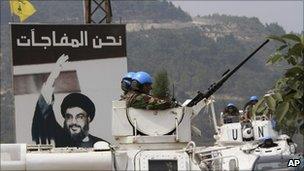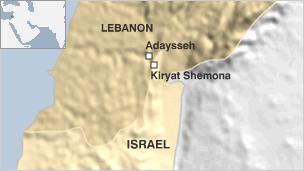Israel and Lebanon avoid escalation of violence
- Published

Israeli troops returned to the area to finish the tree-clearing under Unifil's supervision
It might sound like a line from a cheap Western, but when two sides are not speaking to each other, sometimes it is the guns that do the talking.
On the Lebanese-Israeli border on Tuesday, they had some tough and clear messages for each other.
Perhaps only on this tense border could an operation to uproot one tree lead to fighting which claims four lives.
Israel carried out a similar operation today. Lebanon accepted it had been co-ordinated with the UN peacekeeping force Unifil, and there was no problem.
But why things were different on Tuesday is still not clear. Israel said it had also notified the UN on the first occasion then.
Photographs of the tree-cutting operation show an Israeli soldier perched precariously on what the Americans like to call a "cherry-picker", as it hoisted him over the border fence that separates Israel from Lebanon.
However, the UN has now confirmed Israel's assertion that the soldier was still operating inside Israel's territory, which stretches out a distance beyond the border fence.
That has not stemmed the tough rhetoric, both from Lebanese officials and from the leader of the Hezbollah militia, Sheikh Hassan Nasrallah.
He has warned that his fighters will join in if the fighting breaks out again. That would threaten a much more extended conflict.
Precisely why the Lebanese army reacted so violently to the tree-cutting operation is not clear. Lebanon insists it was confronting an incursion into its territory.
Lebanese rivalry
The Lebanese army only moved into southern Lebanon after the 2006 war between Israel and the Hezbollah militants.
The belief was that the army might be able to rein in Hezbollah and reduce the tension along the border.

The UN has confirmed Israel's claim that the soldier was operating inside Israel's territory
But that would also explain their swiftness in opening fire. The Lebanese army will be keen to be seen to be equally diligent in protecting the homeland as Hezbollah.
Indeed Hassan Nasrallah's tough speech later in the evening suggests a hint of rivalry between the two. He surely would have preferred that his own fighters had picked up the credit for fighting the hated Israelis.
It seems clear that the Lebanese forces opened fire first, so Israel can say it was acting in self-defence.
However, Israel might be criticised by some observers for the vigour of its response, which quickly escalated to the shelling of Lebanese positions, and the deaths of two Lebanese soldiers and of a civilian.
Unfinished business
As so often before, Israel wants to show that any attack on it will be met with the toughest possible response.
It is easy to say that this exchange shows how tense the situation is on the border, with the danger of rapid escalation.
But the lesson of Tuesday's confrontation is that neither side seems to want that, at least for the moment.

Some observers believe that Israel may want to mount a new offensive at some time in the future, to try to reduce the threat from Hezbollah's growing stockpile of missiles.
But there is no sign that Israel is gathering forces now for such an operation, and it did not use this incident as a "casus belli".
On the Lebanese side, there is a fear that Hezbollah might eventually have an interest in a new conflict in the south.
Hezbollah are under particular pressure in Lebanon because they fear being accused, in a new UN report, of complicity in the assassination of the former Prime Minister Rafik Hariri.
But again, they did not take the opportunity presented by this incident to begin a major conflict.
It is one of the cliches of the Middle East that there is much unfinished business in southern Lebanon. The people of both Lebanon and Israel fear a new war could come at any time.
The events of Tuesday illustrate how tense the situation is, and how violence can break out at any time. But in a perverse way Tuesday's events also perhaps show that neither side is ready to move to all-out war, at least not yet.
- Published4 August 2010
- Published4 August 2010
- Published4 August 2010